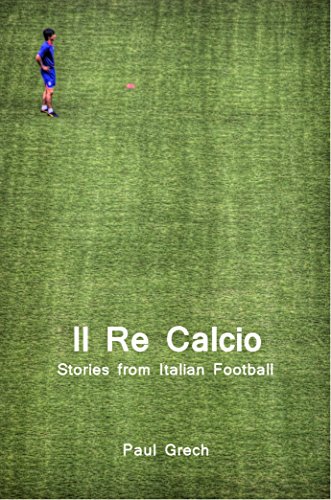The image of Lazio club manager Angelo Peruzzi celebrating the side’s 2017 Italian Super Cup triumph over Juventus is what inspired Paul Grech to write the second part of his e-book series, Il Re Calcio.
To some fans of Italian football born this century, Peruzzi may well have been just another club official hijacking the on-park celebrations. Would they be aware that he was, arguably, the finest goalkeeper in the world during his peak years? This, according to Grech, was a story that needed to be told. “First of all, Peruzzi was an incredible goalkeeper,” he said. “As I write in the book, this seems to have been forgotten because of how good Gigi Buffon – his successor at Juventus – has been. More than that, however, Peruzzi seems to have some wonderful human traits. He is honest, loyal and humble; all characteristics that he showed at different points throughout his career even if it meant great personal sacrifice. That combination is extremely rare.”
With the 24-7 coverage of football on television, online and in print, it’s often very easy to forget that it’s a game played and coached by human beings, whose fate can be decided by time, fortune, circumstance and sometimes tragedy. These elements are all explored in Grech’s latest offering. We read about the striker referred to as ‘providenza’; we learn of the bricklayer who rebuilt Fiorentina after the club was ‘wound up’ in 2002; there’s a poignant tribute to a promising Italian international, who died at the age of 23.
Where did Grech’s love of calcio, and writing about it, come from? The answer goes back to his childhood years and growing up in Malta. “Our proximity to Italy meant that when I was growing up we got to watch a lot of Italian television, so much that most people of my generation actually learned the language off the TV,” he said.
“This meant that we also got to see a lot of Italian football – this was in the pre-Sky and pre-football from around the world on TV era – so it was only natural to take an interest. Back then, the site of men huddled round the radio on Sunday afternoon listening to Tutto Il Calcio Minuto Per Minuto (an Italian radio programme that gave live updates of scores) was a common one. As I grew, I became a subscriber to Guerin Sportivo which was a wonderful weekly magazine about Italian football and I would say that my desire to write grew from there.”
Though Angelo Peruzzi’s outstanding achievements in the game may have been overshadowed by his successor in the Juventus goal, there are other players whose very raison d’etre has been to use their talents to allow their more celebrated colleagues to flourish. One such player was Luca Fusi, who is described by Grech as a ‘water-carrier par excellence’. The term ‘mediano’ is used in Italian football for a player who does the so-called donkey work, thus providing a platform from which the more skillful players in the team can showcase their talents. This was a role in which Fusi excelled, most notably in the great Napoli team of the Maradona era. “Nothing in what he did invited people to talk about or imitate him,” Grech writes. “He was a normal player with an abnormal capacity of holding teams together… Throughout his career he consistently improved every side in which he played by becoming the pivot on which their midfield turned.”
If such a book were to be written in 15 to 20 years’ time, whose story from the current world of Italian football would Grech envisage himself recounting? “This will sound like a cliche but the game has changed so much – and we are bombarded with so much football – that it is difficult to become attached to any one player,” he said. “That said, I do have a special admiration for Marek Hamsik. I remember seeing him play for Brescia in the Serie B and it was immediately apparent that he was a special talent. That he has stayed loyal to Napoli even though it meant, to a certain degree, sacrificing the possibility of success, means a lot to me. It also means that there are a lot of people who perhaps don’t appreciate how good he was, which in my mind makes it a good story to tell.”
The last five words of his above answer – ‘a good story to tell’ – perfectly sum up why Grech has penned his second volume of tales from the Peninsula. If in-depth tactical analysis, facts and figures are what you’re looking for, you’ve come to the wrong place. If, however, you want to find out which Italy World Cup striker has gone on to win two World Rally Championship races or which former most expensive footballer in the world now plays in regional billiards championships, then Grech’s book is for you.

